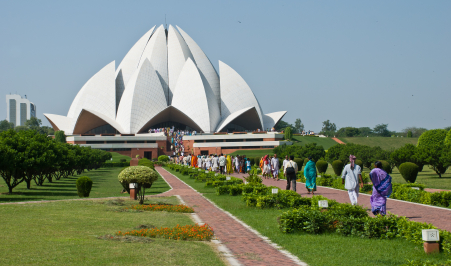The Role of Religion in the Fight Against the Coronavirus Pandemic
New Delhi, 22 April 2020: Twenty five leaders and representatives of religious and interfaith organizations in India have issued a joint statement on the constructive role religion should play in uniting people of all faiths in the fight against coronavirus. The statement was issued in response to the urgent need for all religions in the country to “speak with one voice” in emphasizing the importance of unity, service to the common good and the need to follow scientific prescriptions at such a difficult time. While calling upon people to unite in their commitment to common spiritual principles, the statement also calls for the rejection of prejudice, a sense of exclusivity, superstition and fanaticism spread in the name of religion.
The statement has been signed by noted representatives of Hindu, Muslim, Christian, Bahá’í, Jewish, Buddhist, Jain and Sikh communities and interfaith organizations including Swami Chidanand Saraswati of the Parmarth Niketan Ashram; Dr. Imam Umer Ahmed Ilyasi, Chief Imam, All India Imam Organization; Dr. Anil Joseph Thomas Couto, Archbishop of Delhi; Rabbi Ezekiel Malekar of the Judah Hayam Synagogue; Swami Shantatmananda, of the Ramakrishna Mission; Goswami Sushil Ji Maharaj of the Bhartiya Sarv Dharm Sansad; Archarya Lokesh Muni of Ahimsa Vishva Bharati; Paramjeet Singh Chandok of the Bangla Sahib Gurudwara; Swami Agnivesh; Geshe Dorji Damdul of Tibet House and the Bahá’í Office of Public Affairs.

Stating that “religion is probably the most powerful means for mobilizing human conscience to serve the common good”, the statement states that at this critical time its powers must “come together as a singular force to lend impetus” to the united action to overcome the pandemic.
The statement elaborates on the principles of oneness of religion, oneness of humankind, service to the common good and harmony of science and religion and on their implications for the present crisis. Discussing the principle of oneness of religion, it states that this principle provides “the foundation on which people of all religions can learn to draw upon a common spiritual heritage to fight collective challenges” and to reject religious prejudices.
It further mentions that “the spread of coronavirus provides a testament to the oneness and interconnectedness of the human family” while the “tendency to be selfish or self-centered as an individual, a community or a nation” has proven to be “a dangerous and life-threatening delusion”. It calls upon people of all religions at this time to dedicate themselves to the religious ideal of “selfless and sacrificial service to the common good”. While highlighting the exceptional contributions of those risking their lives to render essential services at this time, it emphasizes that for most citizens service will take the form of “scrupulously adhering to the norms of social distancing and willingly accepting the restrictions placed on their social and economic lives” in the interest of the wellbeing of society.
The statement also strongly condemns unscientific beliefs and practices being propagated in the name of religion which have exposed “thousands to the virus” and vitiated “public discourse with half-truths, falsehoods, conspiracy theories and doomsday narratives”. Calling for clarity of thought, the statement emphasizes that true religion is in harmony with science and reason and it does not endorse superstitious and fanatical beliefs and statements.









